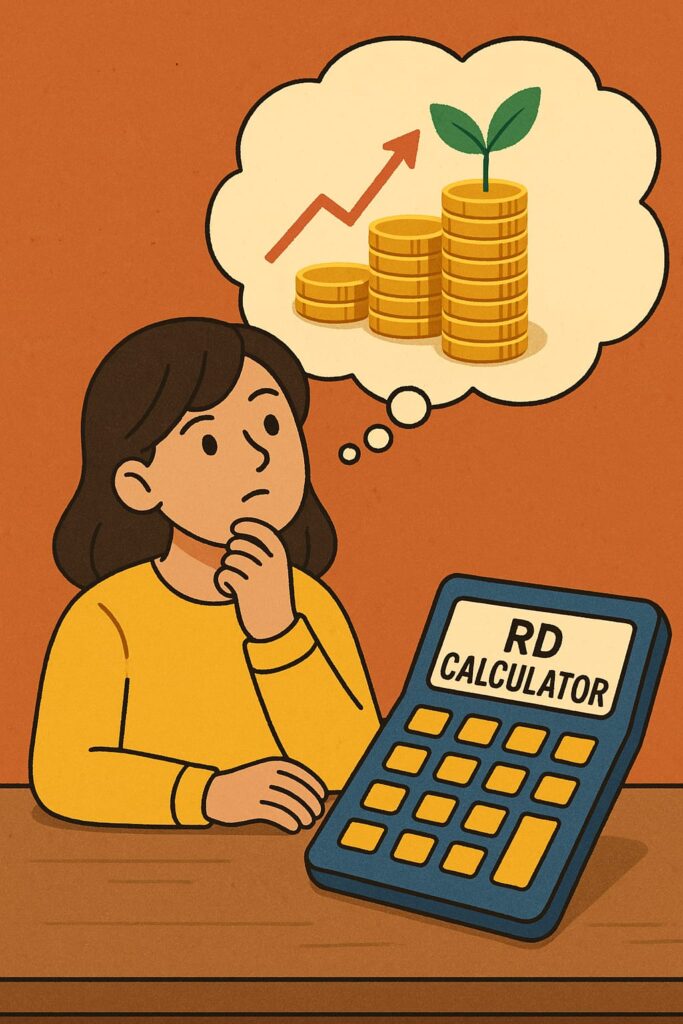A recurring deposit (RD) offers a structured way to build disciplined savings over time. If you’re uncertain about how much you’ll earn upon maturity, knowing how to calculate RD interest becomes essential for better financial planning. Fortunately, using an RD calculator simplifies the process and provides accurate projections, helping you map your savings more effectively.
What Is a Recurring Deposit?
A recurring deposit is a type of investment where a fixed amount is deposited monthly over a chosen tenure. The bank adds interest to these periodic payments, and the final maturity amount includes both your principal and the accumulated interest.
Each deposit earns interest based on how long it remains in the account. Unlike fixed deposits, which require a lump-sum investment, RDs promote regular savings—making them suitable for salaried individuals or anyone seeking consistent, smaller contributions. Since banks typically compound interest every quarter, the final maturity amount is higher than it would be with monthly compounding.
How Is Interest on an RD Calculated?
Interest on a recurring deposit is usually calculated using a compound interest formula with quarterly compounding. The standard formula used by most banks is:
M = R[(1+i)^n – 1] / (1 – (1+i)^(-1/3))
Where:
M = Maturity Amount
R = Monthly Deposit
i = Interest Rate ÷ 400
n = Total Number of Quarters
For example, if you deposit ₹5,000 every month for 12 months at an annual interest rate of 8%:
-
R = ₹5,000
-
i = 0.02
-
n = 4 quarters
The calculator will show the maturity value, which comes out to slightly more than ₹62,000.
This formula, while precise, can be complex to compute manually. That’s why using an RD calculator is recommended. Just enter the monthly amount, interest rate, and tenure to instantly view the maturity value. Much like an SIP calculator, it offers a fast and reliable estimate of how your investment will grow.
How to Use a Recurring Deposit Calculator?
With the advancement of digital banking, estimating your RD returns has never been easier. You no longer need to open an actual RD account to forecast returns—most banks offer an online interest calculator for RDs that delivers quick and accurate results.
To use it, you’ll need to enter:
-
Your monthly deposit amount
-
The interest rate
-
The investment duration
After inputting these details, the tool will automatically calculate your final amount and total interest earned. This becomes especially useful when saving for a specific goal, as it helps define your monthly savings target.
Banks generally apply compound interest quarterly on RDs. If you begin investing in the middle of a quarter, simple interest might apply until the next compounding cycle begins—leading to small variations between your manual calculations and actual maturity value.
A dependable compound interest calculator ensures that your projections remain accurate, especially for long-term investments. Also, remember that senior citizen deposits usually benefit from higher interest rates.
Key Benefits of Using an RD Calculator
Since RD interest involves several variables such as tenure, amount, and interest rate, manual calculation can be challenging. That’s why using an RD calculator offers significant advantages:
1. Simplifies the Math
You don’t have to struggle with formulas. Enter a few details, and the tool provides your maturity amount instantly—eliminating guesswork and complexity.
2. Saves Time and Reduces Mistakes
Manual calculations can be time-consuming and prone to errors. Using an RD calculator gives you quick results with greater accuracy, allowing you to focus on your investment planning.
3. Enhances Budgeting and Planning
Knowing your future returns enables smarter planning. Whether you’re saving for a holiday, emergency fund, or educational expenses, the tool helps ensure your monthly savings align with your goals.
4. Provides Reliable Estimates
When accuracy matters, RD calculators deliver. You can tweak different inputs—tenure, amount, and rate—to find the ideal plan for your financial objectives.
What Factors Affect RD Interest and Maturity Value?
Several aspects influence the returns you receive from a recurring deposit:
-
Monthly Deposit Amount – The more you deposit each month, the higher your final maturity value.
-
Interest Rate – A better rate leads to more earnings on your investment.
-
Investment Tenure – Longer tenures allow interest to compound more, increasing overall returns.
-
Compounding Frequency – Since banks use quarterly compounding, your interest earns more interest over time.
-
Senior Citizen Status – Many banks offer higher interest rates on senior citizen deposits, boosting your maturity value.
-
Timing of Deposits – Starting in the middle of a quarter may result in simple interest initially, which slightly alters your returns.
Knowing how these factors impact your investment can help you make more informed decisions. If you’re exploring alternatives, try the Mutual Fund Returns Calculator to compare RD earnings with long-term mutual fund SIPs.
Conclusion
Recurring deposits remain a trusted choice for those who prefer consistent, low-risk savings. To get the most out of your investment and stay aligned with your goals, use tools like an RD calculator and other online financial resources.
And if you’re managing a diverse portfolio, a Stock Market App can help you track your SIPs, equities, and overall performance—helping you balance between conservative instruments like RDs and more growth-oriented options.
- Don’t Guess RD Returns—Use This Smart Calculator Now
- Want to know how much your RD will earn? Use an RD calculator to get accurate maturity value, interest earned, and plan your monthly savings confidently.
- #RDCalculator #RecurringDeposit #SmartSaving #CompoundInterest #FinancialPlanning #MonthlySavings #InterestCalculator #SavingsGoals #WealthBuilding #PersonalFinance
Related posts:
 From The First AI Unicorn To The Death Of Angel Tax: The Biggest Highlights For Indian Startups In 2024
From The First AI Unicorn To The Death Of Angel Tax: The Biggest Highlights For Indian Startups In 2024
 Uncommon Symptoms of TB: When Tuberculosis Affects Other Parts of the Body
Uncommon Symptoms of TB: When Tuberculosis Affects Other Parts of the Body
 Winter Park Lawyer: Your Legal Ally in Florida’s Charming City
Winter Park Lawyer: Your Legal Ally in Florida’s Charming City
 A Step-by-Step Guide to Private Limited Registration in Bangalore
A Step-by-Step Guide to Private Limited Registration in Bangalore
 A Step-by-Step Guide to Private Limited Registration in Bangalore
A Step-by-Step Guide to Private Limited Registration in Bangalore
 Rigid Setup Boxes: The Gold Standard in Premium Packaging Excellence
Rigid Setup Boxes: The Gold Standard in Premium Packaging Excellence
 The Ultimate Convenience of Click and Vape of the Technology
The Ultimate Convenience of Click and Vape of the Technology
 Find Your Perfect Leather or Sport Jacket at The Jacket Seller:
Find Your Perfect Leather or Sport Jacket at The Jacket Seller:








